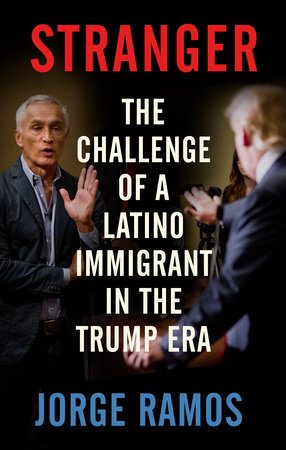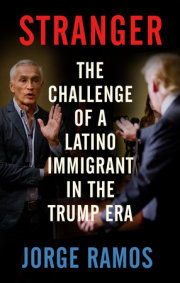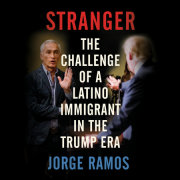Chapter One: Get Out of My Country"Get out of my country.”
I can still hear that sentence with absolute clarity, as if it occupies a specific place in my mind.
It’s a scar.
Deep within.
It happened some time ago, yet it still rings in my ears as if it were yesterday. I don’t even know the name of the man who said it to me. But I have his face and his hatred etched in my eyes and all over my skin.
When somebody hates you, you feel it across your entire body. It’s usually just words. But the shrillness of words laden with hatred works its way under your fingernails, into your hair, around your eyelids. Of course, it also enters through your ears. Eventually, everything seems to be welling up somewhere between the throat and the stomach, to the point where you feel as if you’re drowning. If the feeling builds up over a long enough period of time, something could burst.
The man who said “Get out of my country” was a Trump supporter. I know this because he was wearing a pin identifying the then candidate on one of his lapels. But most of all, I know this because of the way he said it to me. He looked me straight in the eyes, pointed a finger at me, and shouted.
Time and again I’ve gone back to watch video of the incident, which took place in August 2015, and I still don’t know how I was able to remain calm. I remember the tone of his voice caught me by surprise. Trump, with the brutal and cowardly help of a bodyguard, had just ejected me from a press conference in Dubuque, Iowa. I had just started thinking about how to respond when suddenly I heard a madman shouting and pointing his finger.
I looked up, and—instead of simply ignoring his rudeness, as I would have preferred—I settled myself and simply replied, “I’m also a U.S. citizen.”
His response made me laugh. “Whatever,” he said, sounding like a teenager. A police officer who overheard the exchange outside the press conference stepped between us, and that was where it ended. But the hatred stuck.
Hatred is contagious.
And Trump is infectious.
I am convinced that if Trump had treated me differently, his supporter would not have spoken to me as he had. But Trump had just thrown me out of a press conference, and that, somehow, had given this man permission to direct his hatred toward me.
In over three decades as a journalist, such a thing has happened to me only once before. It was 1991, during the first Ibero-American Summit, in Guadalajara, Mexico. One of Fidel Castro’s bodyguards shoved me and threw me aside as I was questioning the Cuban dictator about the lack of basic freedoms on the island.
Trump also used a bodyguard to prevent me from asking a question. He and Fidel used the same tactics of physical force—via their bodyguards—to handle an uncomfortable encounter with the press.
My problems with Trump began in New York on June 16, 2015, the day he launched his presidential campaign. It was there that he made the following statement: “When Mexico sends its people, they’re not sending their best. . . . They’re sending people that have lots of problems, and they’re bringing those problems with us. They’re bringing drugs. They’re bringing crime. They’re rapists. And some, I assume, are good people. . . . It’s coming from more than Mexico. It’s coming from all over South and Latin America. . . .”
These are racist comments. Period.
He lumped all Mexican and Latin American immigrants in the same bag. He made a sweeping generalization. He lacked the intellectual honesty to say that only some immigrants commit crimes, not the majority of them. Later, several of Trump’s supporters swore that he was referring only to a specific type of undocumented immigrant—the most violent ones—not all who come across the southern border.
Perhaps. We will never know for sure. But regardless, that is not what he said. What I do know is that when Trump launched his campaign, he accused all Mexican immigrants of being criminals, drug traffickers, and rapists.
What he said is absolutely false.
All the studies I have read—especially the one conducted by the American Immigration Council—have come to the same conclusion: namely, that “immigrants are less likely to commit serious crimes or be behind bars than the native-born, and high rates of immigration are associated with lower rates of violent crime and property crime.”
Trump started his path to the White House with a massive lie.
His first statements as a candidate took me by surprise. They bothered me deeply. For days and even weeks later, I felt very unsettled. I wasn’t sure how to respond. As a reporter, as a Latino, and as an immigrant, I had to do something. I just didn’t know exactly what. It would have to be a well-calibrated answer, not the diplomatic and aseptic response of a politician. Nor could it be an insulting jab.
Univision, the company I’ve been working for since January 1984, had made the courageous decision to break off its business relationship with Trump and not broadcast the Miss USA beauty pageant—which was owned in part by the businessman—on Spanish-language television for “insulting remarks about Mexican immigrants.” This would mark the beginning of a lengthy legal battle.
Despite all that, I felt Trump had to be confronted on a journalistic level as well. This was not simply a business matter. So on the same day that Univision announced the end of its working relationship with Trump, I sent him a handwritten letter requesting an interview. That letter, dated June 25, 2015, read as follows:
Mr. Trump:
I want to write you personally to request an interview. But so far your team has declined.
I am sure you have a lot of things to say . . . and I have a lot of things to ask. I’ll go to New York or wherever you would like.
If you would like to talk first over the phone, my personal cell is 305-794-1212.
I know this is an important issue for you as it is for me.
All the best,
Jorge Ramos
I sealed it inside a FedEx Express envelope and sent it to his New York offices. The next day, out of nowhere, I began receiving hundreds of calls and text messages, some more insulting than others. I didn’t understand what was happening until a coworker of mine came into my office and said, “Trump just posted your cell phone number online.”
These were some of the hundreds of texts I received:
Jorge Ramos- Donald Trump placed your personal letter online and has your number written on it. I’m sorry about what he did.
Go F yourself George Porgie!
Please take the anti-U.S. Univision back to the corrupt 3rd world country Mexico and you can go with it. Thx and have a great trip back.
#Trump2016. Build those walls to stop illegals from crossing our borders.
You’re a racist dirtbag. Nobody wants your illegal cousins in this country.
Trump was right . . . Latinos need to stay off the ‘I’m offended’ bandwaggon. It’s embarrasing. . . . You don’t speak for all Latinos!
Trump 2016! Come to this country legally or leave! Illegal is illegal!!!!
Fuck you
In fact, Trump had answered me via Instagram. He wrote, “@Univision said they don’t like Trump yet Jorge Ramos and their other anchors are begging me for interviews.”
Along with that brief message, he included a photograph of the letter I had written to him, without having redacted my phone number.
In addition to these messages loaded with hatred and rage, I received a lot of support. There were others, too, looking to take advantage of the situation and ask me for a job, offer me advice . . . even people looking for help publishing books or recording songs.
It was clear Trump did not want to grant me an interview. However, there were other ways to confront him. Trump had just launched his presidential campaign, and one of its benefits was that he would constantly be talking to the press. That was our opportunity.
We spent nearly two months thinking about what to do. Then, one fine day, Dax Tejera—executive producer of America with Jorge Ramos, the program I hosted for the Fusion television network—had a great idea.
“You’re not going to like what I’m about to say, but we have to go to Iowa,” he said as he walked into my office and plopped down on the only sofa I have. There were many important matters to discuss, but he just sat there, waiting for my reaction.
“Iowa?” I asked. “Why do we have to go to Iowa?”
As always, Dax had done his homework. He had studied all the press conferences Trump had scheduled for the coming weeks, and the one in Iowa represented the best opportunity to meet him face-to-face. Appearances in places such as New York City would be packed with reporters, but not many news organizations would be sending their teams to cover an event in Dubuque, Iowa. Once again, Dax was right.
Copyright © 2018 by Jorge Ramos. All rights reserved. No part of this excerpt may be reproduced or reprinted without permission in writing from the publisher.







